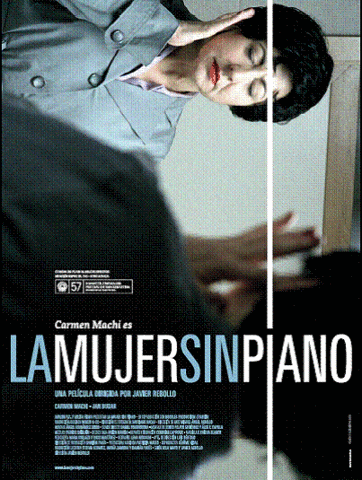Woman Without Piano (Javier Rebollo, 2009): Spain
Reviewed by Skylar Harrison. Viewed at Santa Barbara Film International Film Festival, Metro 4 Theatre.

Woman Without Piano is a Spanish drama directed and co-written by Javier Rebollo. By the end of the film, the majority of viewers would agree with the woman sitting next to me, as she said, “That was like watching paint dry… for the second time.” Yet, that paint, or the film, may have been slow drying, but it is brilliantly profound, risk taking, and comical… and worth seeing. The main characters, Rosa (Carmen Machi) and Radek (Jan Budar), are understated and quirky but at the same reveal inner emotions of isolation and loneliness. They are convincing as insecure, lost, and aging adults through scarce dialogue, making comedic timing into an art form, and are, most importantly, likeable and relatable. These two characters take you on a journey where loneliness is the key catalyst in an attempt to find physical passion and acceptance.
Woman Without Piano follows a middle class Spanish housewife. She has lost twenty per cent of her hearing due to Tinnitus, constantly must have both the TV and radio on, and most significantly feels completely undesirable to her husband. After a day of working, cooking, and cleaning and once her husband has gone to sleep, Rosa puts on a black wig and red lipstick, packs a single suitcase, and leaves. Once she arrives at the train station, it is not clear where she wishes to go. In fact, the film does not reveal whether Rosa knows herself. At the train station, she meets an awkwardly outgoing Polish immigrant, who finds meaning in life by repairing broken appliances and who also happens to be on the run from the Polish police. When the train station must be cleared out, this pair set out to find something or feel something, anything.
The lack of dialogue does not inhibit their obvious connection. In one scene Rosa timidly crawls into bed with the sleeping Polish stranger and kisses him; he kisses back. After the passionate kiss, the theatre was filled with laughter due to the residue of the hot red lipstick left on and around the stranger’s mouth. Although humorous, this kiss was a significant breakthrough in understanding Rosa’s insecurity and desperate need to be sexually desired. As her lipstick rubes of, it is as if she wishes to rub off her own disguise; her one desire is to be desired, both physically and emotionally, as herself.
Along with the lack of dialogue, the lack of music emotionally places the audience in Rosa’s world, extenuating her hearing disorder and isolation; the score and soundtrack is replaced with clashing daytime TV, news radio, and ticking clocks—the kind of auditory clutter that makes one fidget in their seat. Once Rosa leaves her home, there are very few moments when music is present—once when she is on a high from leaving her domestic home and once again when she is walking with her stranger turned companion. The cinematography in its simplicity also hones in on her isolation. In overextended scenes, Rosa stands alone smoking in the street. Life is mundane in Rosa’s world, and the stationary camera captures this throughout the film.
If the quirky characters and theme of loneliness won you over in the French film Amelie, Women Without Piano does the same but captures the theme and characters with a more simple and mature approach. This film is not for the impatient but is rewarding with its look at a candid universal human experience where a woman seeks to fill the empty space of her loneliness. Rebollo boldly takes risks with scare dialogue and music, yet it only highlights the timing of the humor. Its funniest moments are its most relatable: receiving the answering machine, being turned away from just closed restaurants, and being asked to take your cigarette outside time after time. Poignant and witty, this film hones in on a housewife’s attempted escape from loneliness and quest for a true partnership.
About this entry
You’re currently reading “Woman Without Piano (Javier Rebollo, 2009): Spain,” an entry on Student Film Reviews
- Published:
- 02.09.10 / 9am
- Category:
- Films, Santa Barbara Film Festival 2010
1 Comment
Jump to comment form | comments rss [?] | trackback uri [?]